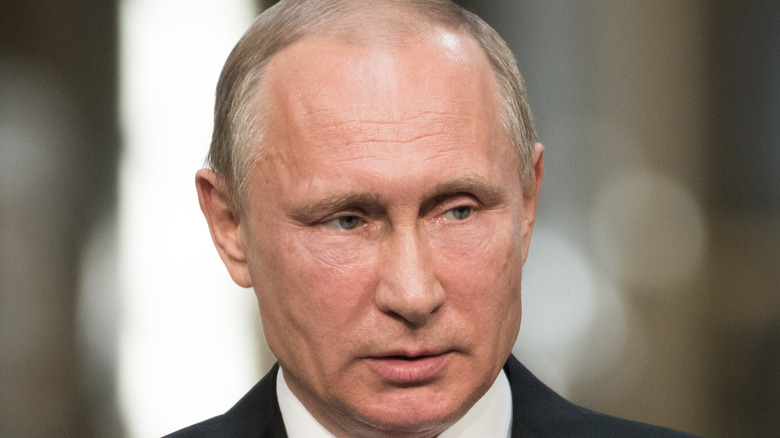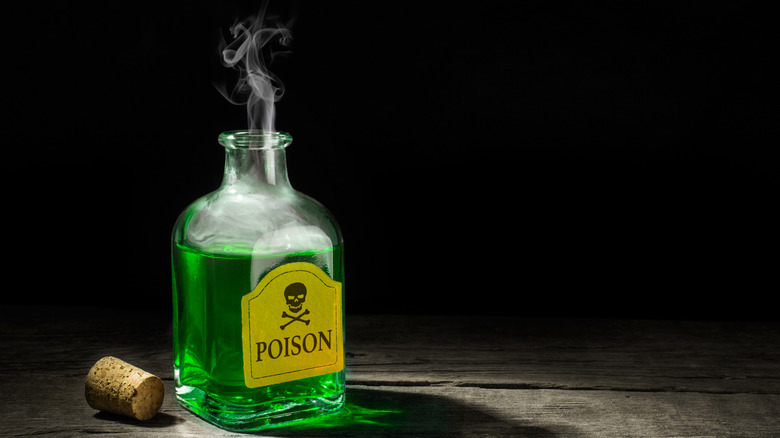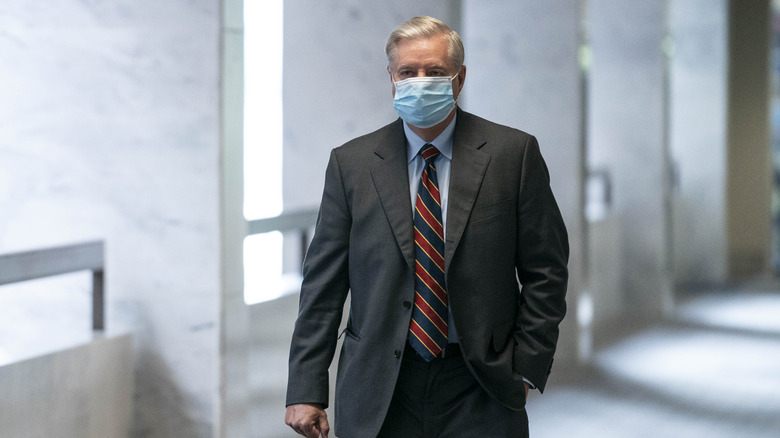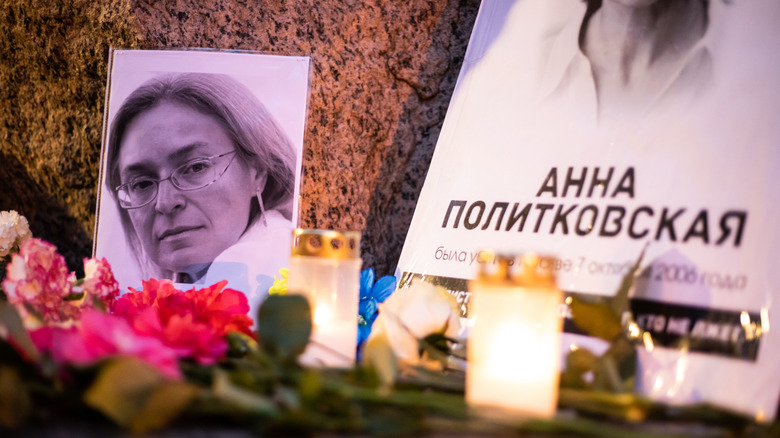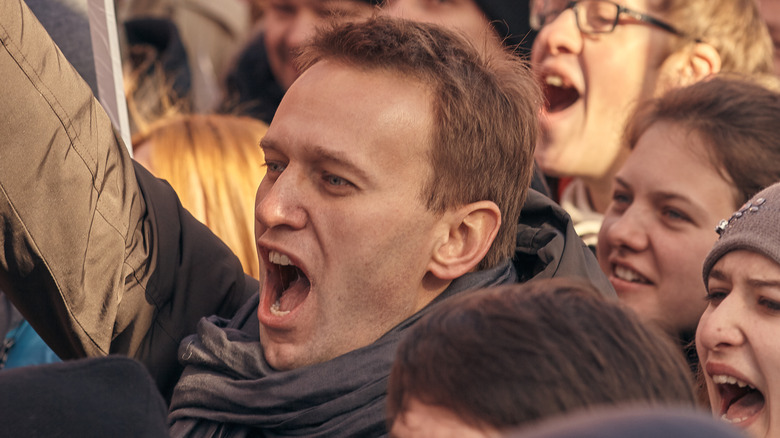The Real Reason Putin Replaced 1,000 Of His Staff Members
Vladimir Putin first served as Russia's President in 1999, up until 2008, when he became the prime minister. He held the position of prime minister until 2012, when he once again took office as president, where he has remained ever since, according to Britannica. At the present time, given the current events taking place, you'd be hard-pressed to find a news outlet not discussing the disturbing acts set in motion by Putin himself. After recently invading Ukraine and causing destruction and devastation, Putin has quickly made himself one of the most hated figures in the world.
When you're responsible for invading another country and causing widespread fear, hardship, and chaos, it's hard to be unaware of the world's disdain for you. Yet, it seems the majority of nations and human beings disagreeing with Putin's actions doesn't bother him too much. However, he has been taking precautionary measures to protect his own life, even from those closest to him — perhaps especially from those closest to him — as tensions rise.
Putin fears being poisoned
According to Insider, Vladimir Putin took steps to protect himself from any attempted assassinations by eliminating 1,000 members of his own staff. The staff he fired ranged from bodyguards to cooks to secretaries — basically, anyone who was close enough to Putin to cause him harm if they so desired.
According to The U.S. Sun, Putin's paranoia has been growing for a lengthy period of time, even before he made the decision to invade Ukraine. He has been known to fire people at any given moment if they happen to do something that raises his suspicions that they might turn against him or make an attempt on his life. This paranoia is what caused him to replace so many of his staff members in the month of February.
Putin's front-running reason for worrying about those closest to him? His fear of them poisoning him. This fear of being poisoned explains why he would make moves to replace everyone that handles items and matters involving his personal life.
There has already been talk of taking out Putin
As it turns out, Putin isn't alone in thinking that someone might make a move to take his life. The idea of taking Putin's life as a way to rectify the invasion of Ukraine has recently been brought up by public figures.
According to Insider, Senator Lindsey Graham (R-S.C.) received backlash from other Republicans when he sent a tweet calling for someone in Russia to "take this guy out." He ended his tweet claiming that an assassination of Putin would "be doing your country — and the world — a great service."
Some Twitter users called for the removal of this post, but Twitter claims that it falls under the "public-interest exception" rule and has left the tweet available to revisit, according to New York Post. So it would seem that Putin isn't alone in thinking that someone may be looking to make an attempt on his life amidst the uproar for which he's responsible.
Death by poison is a large part of Russia's history
Death by poison might not be the first thing everyone thinks of if they ponder a person being assassinated, but poison has a very prominent position throughout Russia's history. The KGB, or Komitet Gosudarstvennoy Bezopasnosti, made poison a top priority while providing security for the Soviet Union.
According to ABC News, the KGB developed a poison lab early on that security agents referred to as "kamera" or "the chamber." This lab created different poisons and found various ways to perfect administering them to those they were intended to harm. While under the rule of Joseph Stalin, the poison was tested on prisoners.
Historian and former military intelligence officer Boris Volodarsky published a book in 2014, "The KGB's Poison Factory: From Lenin to Litvinenko," elaborating the details on the secret poison lab and how the assassination program was created and run for decades. Death by poison is so prominent throughout Russia's history that according to ABC News, a notable person being assassinated by way of poison usually indicates Russia's involvement.
Putin has been blamed for poisoning those who oppose him
Possibly the most significant reason for Putin's fears regarding being assassinated by way of poison is that Putin himself has been pointed out as being behind his fair share of poisonings. Since the early years of Putin's presidency in Russia, protesters and activists who oppose him or don't appear to fit within his goals and opinions run the risk of being killed.
In 2004, an investigative journalist, Anna Politkovskaya, was flying to Beslan, Russia, and fell terribly ill after having a cup of tea, according to ABC News. Politkovskaya didn't die after this occurred. However, she was shot and killed two years later on October 7, Vladimir Putin's birthday.
Two years later in 2006, Alexander Litvinenko was also poisoned after drinking tea. Litninenko was also a critic of Putin and even claimed on his deathbed that Putin was the one responsible for poisoning the tea. Eventually, the European Court of Human Rights found that it was the Kremlin who were responsible for the assassination of Litvinenko by means of radiation poisoning, according to NPR.
Putin is blamed for poisoning Alexei Navalny
Most recently, on August 20, 2020, activist Alexei Navalny became sick while visiting Siberia. He eventually was placed in a coma and medevacked to Germany, where it was discovered that he had been poisoned by Novichok, a Soviet-era nerve agent, according to Explore the Archive. The near-death experience from his attempted assassination is something that Navalny openly blames on Putin. According to Reuters, Navalny has since been jailed and released for his activism, and Russia denies any claims of attempted poisoning. However, Navalny still holds firm to his belief that Putin was responsible for the attempt on his life and persists in his criticism of the Kremlin.
Since the invasion of Ukraine, Navalny has been outspoken and calls for continuous anti-war protests. He has long assisted the gathering of those that stand against Putin and his actions and remains firm in his actions and beliefs. "Let's at least not become a nation of frightened silent people. Of cowards who pretend not to notice the aggressive war against Ukraine unleashed by our obviously insane tsar," Alexei said. With activists, survivors of assassination attempts, and Russia's lengthy history of death by poison, Vladimir Putin has just about every reason to worry that someone close to him might have the idea as a passing thought or worse.
